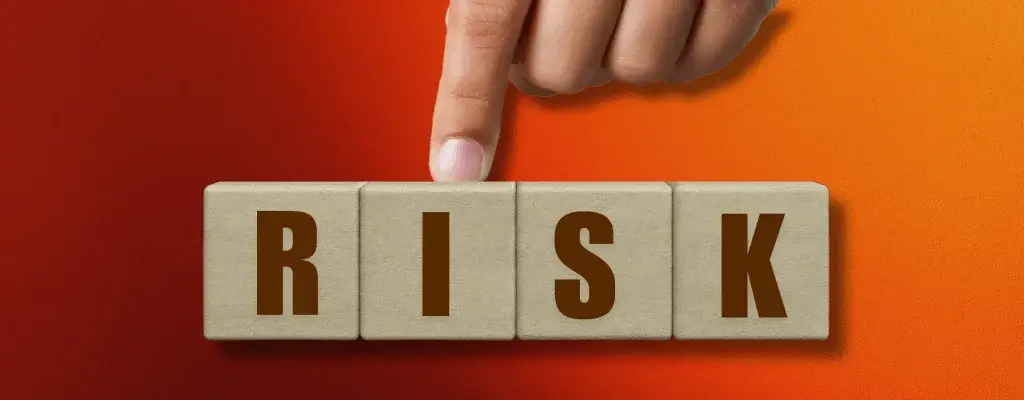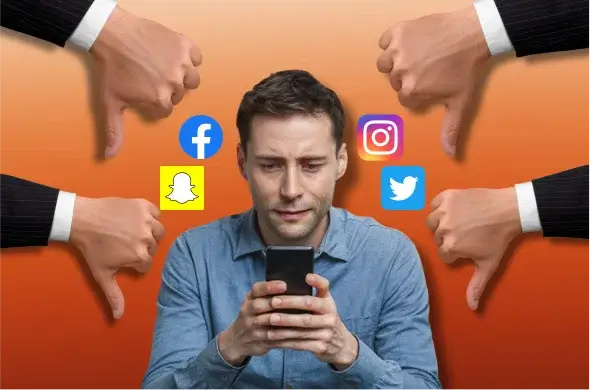For the last two decades, social media has undergone a drastic transformation. From the early days of Myspace to the rise of TikTok, these platforms have undoubtedly changed the way we communicate, share information, and even do business.
As social media incessantly intrudes on human lives, it’s normal for us to think about what’s next. What’s going to be the next fashion trend? What type of content are people into now? Unfortunately, we fail to ask the more significant questions, such as, is social media good or bad?
While there are many ways to answer this, it's safe to say social media is a double-edged sword with benefits and potential harms. In this article, we'll explore why is social media harmful and what content moderation can do about it.
Understanding the Harmful Effects of Social Media

While many of us enjoy social media and see it as a way to relax and express ourselves, it can also be a breeding ground for harmful content and malicious behaviors.
For instance, social media giants like Facebook, Instagram, X, and TikTok may seem all rainbows and butterflies on the surface. However, behind the stunning photos and fun videos are harmful content, including hate speech, sexually explicit images, graphic violence, harassment, and self-harm, among others.
Exposure to inappropriate content can cause younger audiences to mirror the speech and prohibited actions. Meanwhile, users who directly experience cyberbullying, abuse, and harassment online are more likely to suffer from emotional stress, anxiety, and depression.
In general, here are the different areas affected by the potential harms of social media:
Mental Health and Well-being
Harmful content on social media can set off negative emotions, especially for younger minds that can easily be shaped and manipulated. Worse, wandering through the dark side of social media can highlight one’s insecurities, from self-image to other life aspects.
With people celebrating milestones, sharing new experiences, and posting glamorous selfies daily, it’s impossible not to compare and feel inadequate about your looks and your achievements. This can further aggravate feelings of low self-esteem, depression, and anxiety.
Additionally, due to the fear of missing out (or FOMO, as Gen Z calls it), many people must check their social media accounts every minute to stay in the loop. This also means responding to every message, comment, or notification that pops up on their phones, regardless of time and place.
With such excessive use, social media becomes an addiction more than just a tool for communication or momentary entertainment. This addiction can amplify feelings of loneliness and isolation, leading to an array of mental illnesses.
Productivity
Being terminally online can have detrimental effects on one’s productivity in school or the workplace. Instead of using Facebook during breaks, some may get too distracted and stay on the platform for hours.
Prolonged use of social media can cause students to miss deadlines and spend less time on their studies. By the time they feel ready to learn for a test, they might already be too overwhelmed by all the content they consume, leading to information overload.
Conversely, employees with unrestricted time on social media can lead to low productivity and poor quality of work.
Relationships
Counterintuitively, social media can isolate or exclude a person from society. With so much happening online, some people simply find interacting online more interesting rather than engaging in real life.
Meanwhile, some friendships and relationships can suffer from a disconnect when friends or partners choose to stay on their phones instead of having actual conversations.
It can also be troublesome for people who want to gain new friends but struggle with face-to-face communication. Due to self-absorption and social withdrawal, some may lack the social skills and emotional intelligence to form deep and meaningful relationships.
Society
Besides understanding how social media affects an individual’s behavior, it’s also vital to discuss how has social media impacted society.
Over the years, social media has become a breeding ground for misinformation. Fake news and rumors are easily shared across social media platforms, which can cause confusion and chaos among users.
These types of content are often purposefully exaggerated to gain more traction online. Since they are perfectly disguised as news or fact-based material, many people are quick to believe misinformation. As a result, the credibility of academic institutions or journalists who publish factual information is often questioned.
Moreover, due to social media algorithms, biases can easily be reinforced among users. This can create echo chambers where people only view content that affirms their personal beliefs. This can ultimately lead to a polarized society with a lack of empathy and open-mindedness.
Case Studies and Statistics

While it’s easy to say that social media is harmful, real-life case studies and statistics make it certain. Just for an overview, there are around 5.07 billion social media users worldwide as of April 2024, with YouTube hailed as the platform with the most active users.
In recent years, numerous studies and statistics have highlighted the detrimental effects of social media on mental health, well-being, and society. According to a 2022 study by the Pew Research Center, 38% of teens report feeling overwhelmed by the drama on social media, with teenage girls more likely to feel left out by friends and feel worse about their own lives when using these platforms.
Additionally, a report from the American Psychological Association in 2023 found that 41% of teens have poor mental health due to prolonged social media use. In adults, on the other hand, around 59% report that social media has impacted their mental health one way or another, with 37% saying that political discussions on social media have negatively affected them.
Real-life Examples and Testimonials
The negative impacts of social media are not only evident in statistics but also in real-life stories and testimonials. One well-known case is that of Molly Russell, a 14-year-old girl from the UK who took her own life in 2017 after being exposed to disturbing content related to depression and self-harm on Instagram. Her parents have since campaigned for stricter content moderation and better mental health support on social media platforms.
Another example is the rise of cyberbullying, which has been linked to several tragic incidents. In 2020, a 16-year-old student named Channing Smith from Tennessee committed suicide after classmates shared private, intimate messages he had sent, leading to severe bullying and harassment online. His family has been vocal about the need for better monitoring and intervention mechanisms on social media to prevent such incidents.
The Importance of Moderation

With the presented cases and statistics on social media's harmful effects, the necessity of regulating online content cannot be overstated. Social media moderation can reduce harassment, cyberbullying, and other digital threats.
Social media moderation refers to reviewing all user-generated content (UGC), including comments, status updates, images, and videos, to ensure compliance with community guidelines and legal standards.
Social media moderators act as the digital police that keeps user behavior in check. They may remove inappropriate posts or remove their privileges to share content or access the platform. In some cases, non-compliant users can be permanently banned by a social media moderator.
Moreover, they play a crucial role in keeping social media platforms safe for users. Through manual or automated methods, content moderators carefully sift through the ocean of UGC and remove those that harm others.
Automated social media moderation leverages artificial intelligence (AI) technologies like machine learning, natural language processing, and computer vision to detect keywords, objects, and imagery that depict hate speech, non-consensual sexual intentions, nudity, violence, and even illegal content.
With these advancements, more efficient, scalable, and accurate social media moderation services can be guaranteed. As a result, user experiences across different social media platforms can be elevated, ensuring safe and meaningful engagement.
How Moderation Mitigates Risks

Whenever a person logs in on social media, there is always a risk of exposure to harmful online material. However, with effective moderation, these risks are significantly managed through the following:
Reducing Cyberbullying and Harassment
For younger users, cyberbullying and harassment are quite common. Social media moderation helps prevent these unwanted cases by banning specific words and phrases on the platform. For example, profanity, sarcasm, and discriminatory remarks can be quickly detected by an AI system trained on specific datasets about what counts as abusive text or not.
This way, only respectful conversations are encouraged online. By strictly enforcing these regulations, users feel protected, and it leaves the impression that the platform is actually concerned with their well-being.
Combating Informational Disorder
Another pressing concern is how fast fake news spreads on social media. These are often shared by people who actually think the content is true (misinformation) or sometimes deliberately published by people who know it’s false (disinformation).
Fabricated, manipulated, and misleading content can cause polarizing opinions among users, creating chaos and disruption within online communities. These discussions can also lead to outrage, which can have adverse consequences.
Through effective moderation practices, informational disorder can be regulated. By combining human moderators and automated systems, platforms can discern real content from fake ones, promoting platform integrity and online credibility.
Protecting Vulnerable Users
Social media is for everyone, but not everyone on social media is treated equally. Children, teenagers, women, indigenous groups, and people of the LGBTQ+ community are more likely to be harassed online.
Luckily, social media moderation ensures that all people, regardless of their age, sexual orientation, gender identity, race, color, and ethnicity, can express themselves freely and interact without worrying about their safety.
Best Practices for Social Media Moderation

Content moderation processes are never perfect and smooth-sailing. However, there are common practices that make it more consistent, accurate, and efficient. These practices include:
Tip #1 Establish Clear Community Guidelines From the Get-go
The foundation of effective content moderation on social media is having a clear outline of acceptable user behavior and content. This set of rules or community guidelines will serve as the handbook for moderators when dealing with rude and abusive comments, messages, or other harmful content.
Tip #2 Maintain Transparent Communication and Accountability
To successfully reinforce community guidelines, it’s essential to openly communicate the social media moderation process and their expectations from their users.
Platform managers should be transparent about the consequences of violating the established rules and regulations but, at the same time, be accountable for wrongly flagged posts and errors in moderation decisions.
Tip #3 Provide Regular Training to Human Moderators
As social media evolves, UGC also changes its form. To keep up with these changes, human moderators must have regular training sessions to learn about new trends to gain a better contextual understanding behind each user post.
Tip #4 Embrace New Technologies for Moderation
Effective content moderation services can be achieved by embracing a modern approach. Automated moderation through AI is a growing trend in the world of content moderation. Through this, straightforward tasks such as filtering harmful content can be done faster and with precision.
The Imperative of Content Moderation and Responsible Social Media Use
From cyberbullying to misinformation, the harms of social media underscore the critical role of content moderation in fostering a safe online environment. While proactive moderation efforts are essential, being mindful of our social media habits and supporting platforms with robust moderation policies can contribute to a healthier digital space. By prioritizing these practices, we can help mitigate risks and ensure that social media remains a positive, constructive force for both individuals and businesses.
By partnering with Chekkee, the harmful effects and risks of social media use can be mitigated. Through their excellent social media moderation services, you can increase the credibility of your brand across all social media platforms.Keep your social media platforms safe. Contact us today to learn more!



